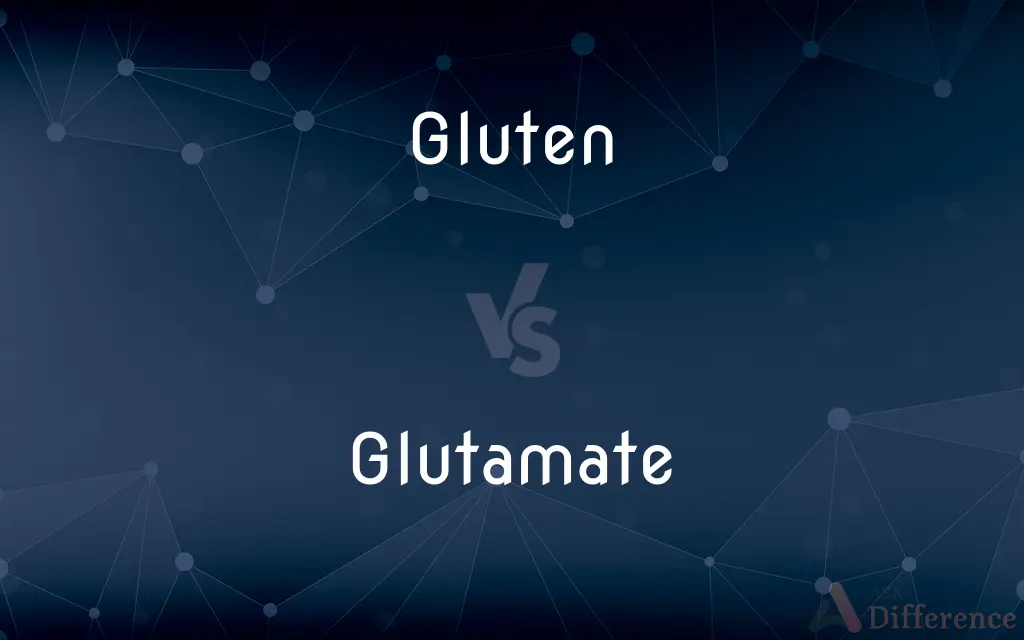Gluten vs. Glutamate — What's the Difference?
By Urooj Arif & Fiza Rafique — Updated on April 29, 2024
Gluten is a protein found in wheat and related grains, essential for giving dough its elasticity and baked goods their structure, while glutamate is an amino acid used in the body and food industry, notably as a flavor enhancer in the form of monosodium.

Difference Between Gluten and Glutamate
Table of Contents
ADVERTISEMENT
Key Differences
Gluten is a group of proteins, specifically gliadin and glutenin, which are primarily found in wheat, barley, and rye. It is crucial in the food industry for its viscoelastic properties, which allow dough to rise and maintain its shape. In contrast, glutamate is an amino acid that occurs naturally in various foods like tomatoes and cheeses and is also produced by the body. It is vital for normal brain function and as a building block of protein.
In dietary terms, gluten is well-known for its role in baking and is a common concern for individuals with gluten-related disorders such as celiac disease or wheat allergies. Glutamate, however, is recognized for its role in enhancing flavors, especially as MSG, a popular food additive that imparts a savory taste known as umami to dishes.
Health perspectives on these compounds vary significantly. Gluten can cause severe health issues for people with celiac disease or non-celiac gluten sensitivity, leading to symptoms like gastrointestinal distress, fatigue, and joint pain. Glutamate, while generally regarded as safe for the general population, can cause discomfort in some individuals, including symptoms like headache and flushing, often referred to as "Chinese restaurant syndrome," though studies show these reactions may not be as common as once thought.
From a nutritional standpoint, gluten does not offer essential nutrients beyond those available in gluten-containing grains, whereas glutamate plays a direct role in brain function and metabolism, making it crucial for bodily functions.
Gluten is significant in various cuisines that rely heavily on wheat products, such as bread, pasta, and pastries. Glutamate, particularly in the form of MSG, has had a substantial impact in Asian cooking and processed food industries worldwide, enhancing flavors and making dishes more palatable.
ADVERTISEMENT
Comparison Chart
Nature
Protein complex
Amino acid
Primary Sources
Wheat, barley, rye
Many foods, both natural and added as MSG
Role in Food
Provides elasticity and structure to dough
Enhances flavors, particularly umami
Dietary Concerns
Celiac disease, gluten sensitivities
MSG sensitivity, although rare
Nutritional Value
Not particularly nutritious
Essential for brain function and metabolism
Compare with Definitions
Gluten
Found in a wide range of food products, often as a binding agent.
Gluten is also present in some cosmetics and skincare products.
Glutamate
An amino acid used by the body to build proteins and as a neurotransmitter.
Glutamate functions as a neurotransmitter in the brain, facilitating signal transmission.
Gluten
Important for baking and cooking, providing texture and moisture retention.
Many vegan meats use gluten as a base for its textural properties.
Glutamate
Plays a critical role in metabolism and brain function.
Glutamate is involved in cognitive functions such as learning and memory.
Gluten
A mixture of proteins found in wheat and related grains, giving dough its elasticity.
Gluten is what makes bread chewy and gives it structure.
Glutamate
Used in the food industry as monosodium glutamate (MSG) to enhance flavor.
MSG is often added to foods to bring out their umami taste.
Gluten
A concern for individuals with celiac disease or gluten sensitivities.
Products labeled as gluten-free are safe for those with gluten intolerances.
Glutamate
Generally recognized as safe but can cause reactions in sensitive individuals.
Some people report headaches or other symptoms after consuming MSG.
Gluten
Can trigger autoimmune reactions in susceptible individuals.
Eating gluten can cause damage to the intestines in people with celiac disease.
Glutamate
Naturally present in foods like tomatoes, cheese, and mushrooms.
Parmesan cheese is high in natural glutamate, enhancing its savory flavor.
Gluten
Gluten is a group of seed storage proteins found in certain cereal grains. Although, strictly speaking, "gluten" pertains only to wheat proteins, in the medical literature it refers to the combination of prolamin and glutelin proteins naturally occurring in all grains that have been demonstrated capable of triggering celiac disease.
Glutamate
A salt or ester of glutamic acid, especially one that functions as a neurotransmitter that excites cells of the central nervous system.
Gluten
The mixture of proteins, including gliadins and glutelins, found in wheat grains, which are not soluble in water and which give wheat dough its elastic texture.
Glutamate
(chemistry) Any salt or ester of glutamic acid.
Gluten
Any of the prolamins found in cereal grains, especially the prolamins in wheat, rye, barley, and possibly oats, that cause digestive disorders such as celiac disease.
Glutamate
(neuroscience) The anion of glutamic acid in its role as a neurotransmitter.
Gluten
(obsolete) Fibrin (formerly considered as one of the "animal humours").
Glutamate
A salt or ester of glutamic acid
Gluten
(rare) Any gluey, sticky substance.
Gluten
The major protein in cereal grains, especially wheat; responsible for the elasticity in dough and the structure in baked bread.
Gluten
(geology) A gluey, sticky mass of clay, bitumen etc.
Gluten
The viscid, tenacious substance which gives adhesiveness to dough.
Gluten
A protein substance that remains when starch is removed from cereal grains; gives cohesiveness to dough
Common Curiosities
Can people be sensitive to both gluten and glutamate?
Yes, though they involve different mechanisms; gluten sensitivity affects the digestive system and can trigger autoimmune responses, while glutamate sensitivity is less common and usually involves transient symptoms like headache.
What is gluten?
Gluten is a protein found in certain grains, such as wheat, that is crucial for giving dough its texture and elasticity.
What are the benefits of consuming glutamate?
Glutamate is essential for normal brain function and plays a role in learning and memory due to its function as a neurotransmitter.
Are there health risks associated with consuming gluten or glutamate?
Gluten can pose serious health risks for individuals with celiac disease or gluten sensitivity. In contrast, glutamate in the form of MSG is generally considered safe, though it may cause mild reactions in some people.
Is it possible to avoid gluten and glutamate in the diet?
Yes, gluten can be avoided by choosing gluten-free grains and products, and glutamate levels can be minimized by reducing the intake of processed foods and MSG.
Is MSG in all processed foods?
Not all, but it is common in many processed foods like snacks, seasonings, and prepared meals for its flavor-enhancing properties.
What is glutamate?
Glutamate is an amino acid important for brain function and as a flavor enhancer in foods.
How are gluten and glutamate used in cooking?
Gluten is vital for baking bread and other bakery items, providing structure and chewiness, whereas glutamate, particularly as MSG, is used to enhance the savory flavor of various dishes.
How can I tell if a product contains gluten or glutamate?
Check the product labeling; foods containing gluten will often list ingredients like wheat, barley, or rye, while products with added glutamate might list monosodium glutamate or MSG.
Why do some people choose gluten-free diets?
Some choose gluten-free diets due to medical conditions like celiac disease, while others may do so because of non-celiac gluten sensitivity or personal dietary preferences.
Are there any substitutes for gluten in baking?
Yes, there are several gluten-free flours and baking mixes available that use alternative grains such as rice, corn, and almond flour.
Can glutamate be produced by the body?
Yes, glutamate is naturally produced by the body and is vital for various metabolic and signaling processes.
What should someone with gluten sensitivity be cautious about in their diet?
Beyond obvious sources like bread and pasta, they should be cautious about less apparent sources like sauces, condiments, and some processed foods, which can contain hidden gluten.
How does gluten affect baking properties?
Gluten helps dough to rise and maintain its shape, providing the chewy texture associated with many types of bread.
What are the best natural sources of glutamate for enhancing flavor?
Foods naturally high in glutamate include Parmesan cheese, tomatoes, mushrooms, and soy sauce, which can enhance flavor without adding MSG.
Share Your Discovery

Previous Comparison
Gallinule vs. Moorhen
Next Comparison
Stymy vs. StymieAuthor Spotlight
Written by
Urooj ArifUrooj is a skilled content writer at Ask Difference, known for her exceptional ability to simplify complex topics into engaging and informative content. With a passion for research and a flair for clear, concise writing, she consistently delivers articles that resonate with our diverse audience.
Co-written by
Fiza RafiqueFiza Rafique is a skilled content writer at AskDifference.com, where she meticulously refines and enhances written pieces. Drawing from her vast editorial expertise, Fiza ensures clarity, accuracy, and precision in every article. Passionate about language, she continually seeks to elevate the quality of content for readers worldwide.














































